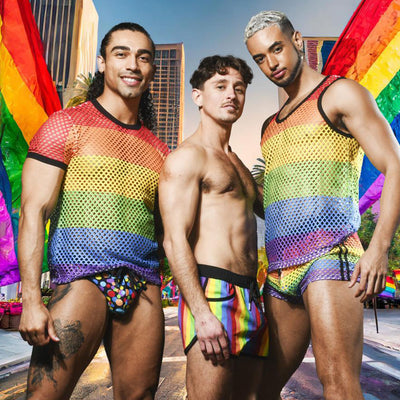Article by Maya Vukovska
Language, just like clothing, hairdos, and tattoos, is a major factor in how we shape our identity and create our self-image. The words we choose to use and the way we use them speak volumes about our character, culture, and education. This is especially valid when it comes to using words belonging to a vocabulary shared by people of a certain social or professional group.
Until relatively recently, concepts and labels for sexual identities didn’t quite exist as they do now. Even the simplest of the words, “gay”, was not used in its alternative meaning as “sexually attracted to people of one’s own sex” until the 1930s! However, there were other words that described homoerotic desire and its various manifestations. Some terms were self-created, and others were callously imposed on gay and bi men. Browsing through the queer slang lexicon from the old times is a lot of fun. There, you find all kinds of funny (although often offensive as well), long-forgotten words for homosexuals like “friend of Dorothy”, “pansy”, “fruitcake”, “Nancy boy”, “pillow biter”, “shirt lifter”, and more. Of course many of these might be considered homophobic if they weren't so charmingly anachronistic and bizarre!
Since the beginning of this century, the LGBTQ vocabulary list has been constantly expanding. Over the course of the past year only, more than a dozen new gender and sexuality terms were added to the Oxford English Dictionary.
Here are the most interesting additions among them.

Enby
Just five years ago, no one would use the term “non-binary” in relation to a gender identity that is neither male nor female. Today, it has become so widespread that it has already yielded its own synonyms. Like the word “enby” here, which is, in fact, the phonetic pronunciation of the abbreviation NB.
Muxe
Pronounced “moo-say”, this word is derived from Spanish “mujer” (woman) and used by the Zapotecs, the indigenous people of Juchitán, Mexico, to refer to the third gender. A muxe would describe themselves as neither a woman nor a man. Or, rather as “a man who has the thoughts of a woman.” Being a muxe in their culture is not grounds for discrimination. On the contrary, muxes has been respected and celebrated as an essential part of the local culture for centuries.
TERF
Or “trans-exclusionary radical feminist”. At the dawn of its existence, the term was intended to be a neutral description, but it quickly grew to become a derogatory one. And not without a reason. All modern TARFs believe that trans women are really men, and men are… well… the evil oppressors of women. These feministic groups treat trans women as predators and trans men as victims of patriarchy. In other words, they don’t like trans people at all. Yuck! Not a good look.
Brotherboy/Sistergirl
Pronounced “brothaboy” and “sistagirl”, these terms are used by Australian Aboriginal and Torres Strait Islander communities to describe transgender people. As you can probably guess, a brotherboy is a person who is assigned female at birth but has a male spirit, and a sistergirl is the opposite version. Both are very inclusive terms as they can be appropriated by everyone, including cisgender people. It is a historical fact that prior to the colonization era, diverse gender presentations were celebrated on this continent. That’s why, you’ll often hear the aborigines say that the gender-binary thing arrived “with the boats.”
Baklâ
The word is in Tagalog - an Austronesian language that is the basis of the standardized national language of the Philippines. The correct pronunciation is “bɐkˈla”, and is the closest Filipino word for “gay”. However, “bakla” does not necessarily denotes a homosexual man. Typically, it refers to a cisgender male who is effeminate in appearance and manners - you know, a guy who’s cooking, taking care of the children, darning fashionable clothes… The opposite of “bakla” is “binalaki”, meaning literally “made a man”, and is used to describe lesbian Filipinos. However, gay, bi, and non-binary people can choose to go by either of the terms.
Teahouse
Colloquially used in U.S. slang, this word is also included in OED with the meaning of “public restroom in which gay men engage in sexual acts with other men.” The “tea” part probably evolved from the British gay slang for “urine”, and, by extension, toilets became known as “tearooms”. So, be careful when you ask for the nearest tearoom when in the States, because instead of having a cup of herbal tea in a regular café, you may find yourself being fucked through a glory hole by men who do not necessarily are into tea!



